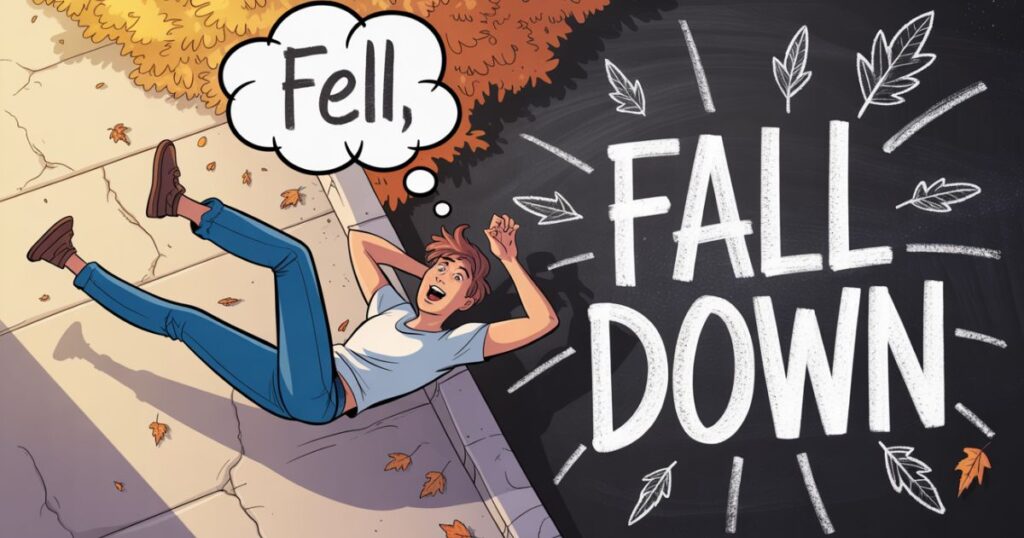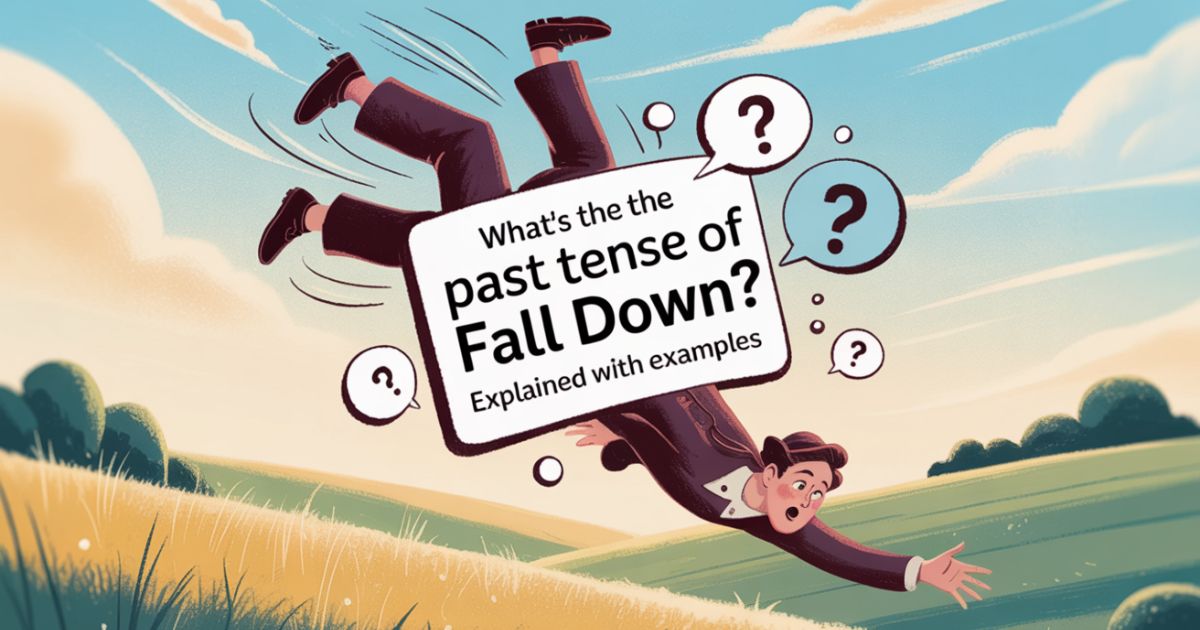Have you ever fallen down and wondered how to talk about it correctly? The phrase fall down is something we hear and use all the time. It means moving from a higher spot to a lower one, usually by accident , and it often happens fast and unexpectedly. Whether it’s a toddler learning to walk or someone slipping on a wet floor, fall down describes those moments perfectly.
But did you know that fall down changes form depending on when it happens? The past tense is fell down, like in “I fell down yesterday.” Getting these forms right can make your English sound clear and natural. This simple phrase captures physical actions like trips, stumbles, and slips , all common in everyday conversation. Mastering fall down helps you describe these actions with ease and confidence.
The past tense of fall down is fell down. This verb transformation follows the pattern of an irregular verb, which means it doesn’t simply add “-ed” like regular verbs do. In English grammar, this kind of verb conjugation requires changing the base form of the verb entirely. So when you’re describing something that happened before now, instead of saying “fall down,” you say “fell down.” For example, in daily use examples, someone might say, “He fell down the stairs yesterday” to describe a past physical movement or fall accident.
Learning verb tense usage through example sentences helps you master the difference between present tense and past tense. In spoken English or everyday conversation, switching between tenses is common. For instance, you might say, “I often fall down when it’s icy,” in the present simple, but if it already happened, you’d say, “I fell down this morning while walking on a slippery surface.” These kinds of sentence examples not only reinforce the grammar rules, they also reflect how language is used in real life.
The reason we say fell down instead of “falled down” lies in how English verb patterns work. The verb “fall” is part of a group known as irregular verbs, which don’t follow the standard conjugation rules. Instead of adding “-ed” to form the past tense, the entire verb changes form. That’s why “fall” becomes “fell.” When paired with “down,” the phrase becomes “fell down,” describing a completed action, such as a toddler falling or someone slipping on a wet floor. Understanding these shifts helps make sense of verb forms in real-world writing.
It’s helpful to look at a tense chart or tense table to see how “fall down” changes across time. For instance, in the past continuous, you might say, “She was falling down the slope,” while in the future perfect continuous, it could become, “By sunset, they will have been falling down the ski slope for hours.” These structures are part of broader grammar structure knowledge and are essential when learning to write and speak with accuracy and fluency in English.
Read More: What is the past tense of swing? Is it swing, swang or swung?
The phrase fall down refers to an often unintentional downward motion, typically involving someone or something losing balance and moving from a higher position to a lower one. It’s commonly used in both literal and figurative contexts. For example, a child might trip or stumble and fall down while learning to walk. In the case of natural events, tree branches might collapse or topple during storm weather. The phrase encapsulates a physical action that’s part of everyday conversation, especially when describing hiking safety or slippery floors.
In a broader sense, “fall down” is one of those phrases rooted deeply in Old English. The verb “fall” comes from “feallan,” which meant to drop or descend. Combined with “down,” it emphasizes the physical movement involved. Whether you’re talking about ice skating, walking in high heels, or running an obstacle course, the idea of losing footing and dropping suddenly applies. Understanding the origin of words like this enriches your vocabulary and makes learning English grammar feel more intuitive and relevant.
| Tense Name | Example with “fall down” |
| Present Simple | I fall down a lot during yoga class. |
| Past Simple | I fell down yesterday on a wet floor. |
| Future Simple | I will fall down if I’m not careful. |
| Present Continuous | I am falling down on this icy sidewalk. |
| Past Continuous | I was falling down when you saw me. |
| Future Continuous | I will be falling down all day if it snows. |
| Present Perfect | I have fallen down several times this week. |
| Past Perfect | I had fallen down before the race even started. |
| Future Perfect | I will have fallen down by the time you arrive. |
| Present Perfect Continuous | I have been falling down more often lately. |
| Past Perfect Continuous | I had been falling down before I got new shoes. |
| Future Perfect Continuous | I will have been falling down for an hour soon. |
| Base Form (Infinitive) | To fall down can be dangerous on a ski slope. |
The phrase “fall down” comes from Old English, where the verb “feallan” meant to drop or descend. Over centuries, this evolved through Middle English into the modern expression. It describes a downward motion, often sudden or unintentional, and became common in spoken English to explain physical movement or accidents.
Using “fall down” and “fell down” in sentences helps clarify verb tense usage in English grammar. “Fall down” fits the present tense, while “fell down” is its past tense form. These verb forms often appear in daily use examples, especially in spoken English, when describing physical movement or unexpected accidents.
- I fall down whenever the floor is slippery.
- She often falls down during her morning jog.
- Watch out or you might fall down on the wet pavement.
- Toddlers frequently fall down while learning to walk.
- Leaves fall down from the trees every autumn.
- If you don’t tie your shoelaces, you could fall down.
- The branches fall down when the wind is strong.
- People sometimes fall down on icy sidewalks.
- Athletes fall down during intense training sessions.
- He always tries not to fall down while hiking steep trails.
- Yesterday, I fell down and scraped my knee.
- She fell down the stairs last week but wasn’t hurt.
- The vase fell down and broke during the earthquake.
- He fell down while skateboarding in the park.
- They fell down when the ground was slippery from rain.
- The toddler fell down several times before learning to walk.
- During the game, the player fell down after a collision.
- The old tree branch fell down during the storm.
- I fell down the hill while trying to catch the ball.
- She fell down laughing at the funny joke yesterday.

Synonyms of “fall down” include words like collapse, tumble, and stumble, describing the action in present tense. For the past tense, “fell down” synonyms such as tumbled, crashed, and plunged capture similar meanings of falling or dropping.
- Collapse
- Tumble
- Descend
- Topple
- Drop
- Stumble
- Slump
- Trip
- Plummet
- Subside
- Tumbled
- Collapsed
- Toppled
- Descended
- Dropped
- Stumbled
- Crashed
- Sank
- Tripped
- Plunged
Understanding how to use fall down is very helpful. The phrase fall down shows a physical action. You can say it when someone trips, stumbles, or slips. The past tense, fell down, tells us about something that already happened. For example, “He fell down on the wet floor.” Using fall down and fell down the right way makes your English clear and easy to understand.
Remember, fall down is part of everyday speech. You might hear it at home, school, or work. It talks about quick, sudden movements like a fall accident or losing balance. Learning the correct verb forms, like fall down and fell down, helps with your grammar and speaking skills. So keep practicing these words. Soon, you’ll use fall down naturally in your daily conversations. It’s a simple phrase with many uses. Now you know how to use fall down well.

Grammarbeam is a smart language assistant built for clarity, creativity, and precision. From polishing grammar to exploring rich synonyms and refining sentence structure, Grammarbeam is your go-to tool for powerful communication. If you’re writing for school, business, or just for fun — let your words shine with Grammarbeam.

